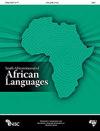从Xitsonga翻译的角度看英语平面广告的语义特征
IF 0.4
0 LANGUAGE & LINGUISTICS
引用次数: 0
摘要
作者在广告中的写作风格和措辞使语言在翻译中具有专门性。根据西通加报纸更喜欢用英语做广告的观察,将广告从英语翻译成西通加仍然被低估了。本文探讨了两个平面广告的语料库,并采用文献分析的描述性定性设计,对英语中的隐喻性陈述和微妙词语的翻译进行了深入分析。这项研究以翻译理论的功能主义方法为基础,以说明所选广告的动态性质。这篇文章揭露了英语统治和霸权的混乱、威胁、偏见和语言动机,这些都是诋毁西通加的经常隐藏的企图。问题是:Xitsonga广告如何以英语语义特征恰当地表达,并对目标读者仍然有意义?文章指出,将广告从英语翻译成Xitsonga正处于被宣布为“改编”或“转写”的风口浪尖。然而,它认为,由于广告的特点是有说服力的含义,它需要译者在翻译中熟练地运用功能主义方法。本文章由计算机程序翻译,如有差异,请以英文原文为准。
Semantic features in English print advertisements: a Xitsonga translation perspective
Authors’ writing styles and diction applied in advertisements give the language a specialised aspect in translation. The translation of advertisements from English into Xitsonga is still undervalued, based on the observation that Xitsonga newspapers prefer to advertise in English. This article explores a corpus of two print advertisements and employs a descriptive qualitative design by document analysis to provide an in-depth analysis of the translation of both metaphoric statements and subtle words from English into Xitsonga. The study is underpinned by the functionalist approach of translation theory to illustrate the dynamic nature of the selected advertisements. The article exposes the confusion, threats, prejudice and linguistic motives of domination by and hegemony of English as the often-hidden attempts to discredit Xitsonga. The question is: How can Xitsonga advertisements be appropriately couched in English semantic features and still make sense to the target reader? The article observes that the translation of advertisements from English into Xitsonga is at the cusp of being declared ‘adaptation’ or ‘transcreation’. However, it posits that since advertising is characterised by persuasive meaning, it requires the translator’s skilful manipulation of the functionalist approach in translation.
求助全文
通过发布文献求助,成功后即可免费获取论文全文。
去求助
来源期刊

South African Journal of African Languages
LANGUAGE & LINGUISTICS-
CiteScore
0.50
自引率
0.00%
发文量
30
期刊介绍:
The South African Journal of African Languages is a peer-reviewed research journal devoted to the advancement of African (Bantu) and Khoi-San languages and literatures. Papers, book reviews and polemic contributions of a scientific nature in any of the core areas of linguistics, both theoretical (e.g. syntax, phonology, semantics) and applied (e.g. sociolinguistic topics, language teaching, language policy), and literature, based on original research in the context of the African languages, are welcome. The journal is the official mouthpiece of the African Language Association of Southern Africa (ALASA), established in 1979.
 求助内容:
求助内容: 应助结果提醒方式:
应助结果提醒方式:


